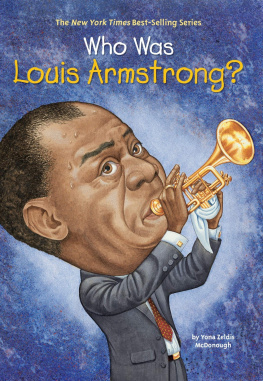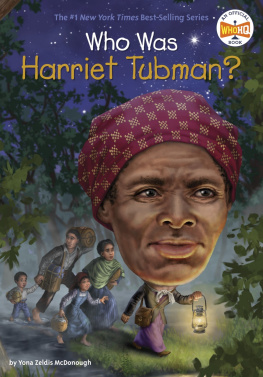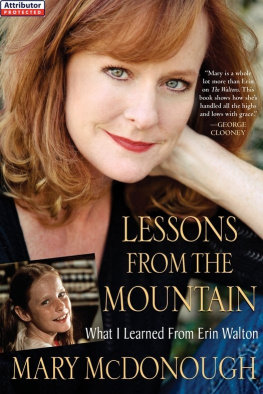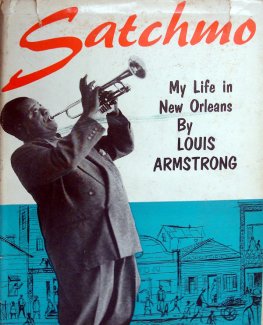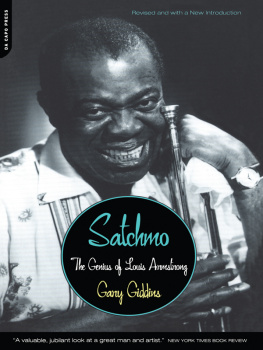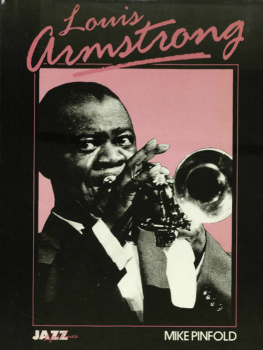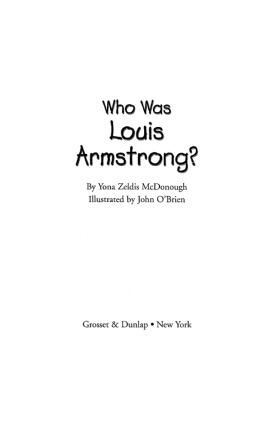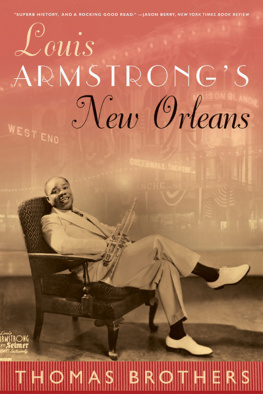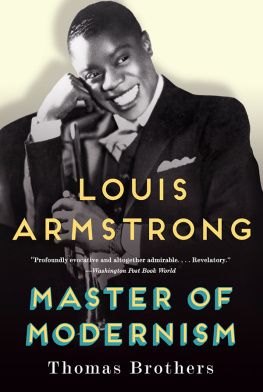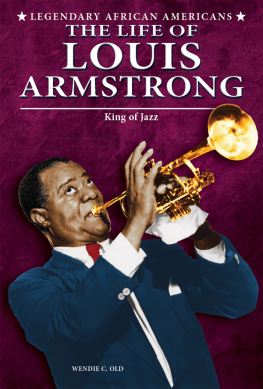McDonough - Who Was Louis Armstrong?
Here you can read online McDonough - Who Was Louis Armstrong? full text of the book (entire story) in english for free. Download pdf and epub, get meaning, cover and reviews about this ebook. year: 2004, publisher: Penguin Group US, genre: Non-fiction. Description of the work, (preface) as well as reviews are available. Best literature library LitArk.com created for fans of good reading and offers a wide selection of genres:
Romance novel
Science fiction
Adventure
Detective
Science
History
Home and family
Prose
Art
Politics
Computer
Non-fiction
Religion
Business
Children
Humor
Choose a favorite category and find really read worthwhile books. Enjoy immersion in the world of imagination, feel the emotions of the characters or learn something new for yourself, make an fascinating discovery.
- Book:Who Was Louis Armstrong?
- Author:
- Publisher:Penguin Group US
- Genre:
- Year:2004
- Rating:4 / 5
- Favourites:Add to favourites
- Your mark:
- 80
- 1
- 2
- 3
- 4
- 5
Who Was Louis Armstrong?: summary, description and annotation
We offer to read an annotation, description, summary or preface (depends on what the author of the book "Who Was Louis Armstrong?" wrote himself). If you haven't found the necessary information about the book — write in the comments, we will try to find it.
Who Was Louis Armstrong? — read online for free the complete book (whole text) full work
Below is the text of the book, divided by pages. System saving the place of the last page read, allows you to conveniently read the book "Who Was Louis Armstrong?" online for free, without having to search again every time where you left off. Put a bookmark, and you can go to the page where you finished reading at any time.
Font size:
Interval:
Bookmark:
Who Was
Louis
Armstrong?
By Yona Zeldis McDonough
Illustrated by John OBrien
Grosset & Dunlap New York
For Jane OConnor, editor
extraordinaireY.Z.M.
For TessJ.O.B
The scanning, uploading, and distribution of this book via the Internet or via any other means without the permission of the publisher is illegal and punishable by law. Please purchase only electronic editions and do not participate in or encourage electronic piracy of copyrighted materials. Your support of the authors rights is appreciated.
Text copyright 2004 by Yona Zeldis McDonough. Illustrations copyright 2004 by John OBrien. Cover illustration copyright 2004 by Nancy Harrison. All rights reserved. Published by Grosset & Dunlap, a division of Penguin Young Readers Group, 345 Hudson Street, New York, New York 10014. GROSSET & DUNLAP is a trademark of Penguin Group (USA) Inc. Printed in the U.S.A.
Library of Congress Cataloging-in-Publication Data
McDonough, Yona Zeldis.
Who was Louis Armstrong? / by Yona Zeldis McDonough; illustrated by John OBrien.
v. cm.
Contents: Who was Louis Armstrong? A rough and tumble start A home away from home Making music King of jazz Ups and downs A question of color Hello and good-bye.
ISBN: 978-1-101-63996-2
1. Armstrong, Louis, 19011971Juvenile literature. 2. Jazz musiciansUnited StatesBiographyJuvenile literature. 3. African American jazz musiciansBiographyJuvenile literature. [1. Armstrong, Louis, 19011971. 2. Musicians. 3. Jazz. 4. African AmericansBiography.] I. OBrien, John, 1953, ill. II. Title.
ML3930.A75M33 2004
781.65092dc22
2003024471
17 16 15

Louis Armstrong?

Once, there was a poor black boy who grew up in New Orleans in the early years of the twentieth century. His name was Louis Armstrong. But people called him Little Louie. To help his family, he did all kinds of jobs. He hunted for bits of brass and tinfoil that he sold to junk dealers. He peddled newspapers on the streets, and he ran errands for grown-ups.


Louis also formed a singing group with three of his friends. The boys stood on a corner and sang. People gave them money.
On New Years Eve, when Little Louie was about twelve, he and his friends went out to sing. They had just finished a song called My Brazilian Beauty and were on their way home. One of his pals took out a cap gun and shot it into the air. He wanted to make noise, because it was New Years Eve. Louie did, too. And he had a real gun. He took it out and pointed it up at the sky. Bam! Bam! Bam! A policeman heard the gunshots. Shooting a gun was very dangerous. It was also against the law. The policeman took Louie down to the station, and the next day he was sent to a reform school. Reform schools were for boys who were too young to be sent to jail.

Years later, Louis Armstrong remembered that he thought his world was coming to an end then. As it turned out, going to the reform school saved his life. While he was in the school, he learned to play the cornet. He learned to play it so well that he grew up to become one of the greatest jazz musicians of all time. He composed dozens of songs that have become famous, and his music is still heard and loved today.



A Rough and Tumble Start

Louis Armstrong was born in 1901 in a poor, black section of New Orleans called Storyville. It was so dangerous that its nickname was the Battlefield. Many people carried guns or knives wherever they went. There was lots of crime.
Louiss mother, Mayann Armstrong, had to support her two children all by herself. Sometimes, she worked as a maid. Sometimes, she went away for days at a time. Louis and his little sister Beatrice were often left with their grandmother. Her name was Josephine, and she had been a slave. Now, she made a living washing and ironing clothes for white people. She gave Louis a nickel to pick up and deliver her wash loads. It made him feel rich.

Josephine was very strict. She made Louis go to school, to church, and to Sunday school. When he was bad, she swatted his behind with a branch. But later, Louis was grateful for her concern. She wanted to keep him out of trouble because she cared about what happened to him.
It was not easy to be a young African-American boy in the early 1900s. Though slavery had ended in 1865, many white people thought blacks were not as good as white people. They were often treated unfairly.

JIM CROW LAWS
SLAVERY ENDED IN 1865. ALL AFRICAN AMERICANS BECAME FREE MEN AND WOMEN. BUT IN THE 1880S AND 1890S, NEW LAWS WERE PASSED IN THE SOUTH THAT RESTRICTED THE RIGHTS OF PEOPLE OF COLOR. THEY HAD TO SIT IN SEPARATE RAILROAD CARS, ATTEND SEPARATE SCHOOLS, USE SEPARATE PUBLIC RESTROOMS AND WATER FOUNTAINS. PEOPLE OF COLOR COULDNT EAT IN CERTAIN RESTAURANTS, STAY IN CERTAIN HOTELS, OR LIVE IN CERTAIN NEIGHBORHOODS. THEY WERE TREATED AS SECOND-CLASS CITIZENS.
THE LAWS WERE KNOWN AS JIM CROW LAWS. THE NAME CAME FROM A CHARACTER IN MINSTREL SHOWS, USUALLY PLAYED BY A WHITE MAN MADE UP TO APPEAR BLACK. THESE TERRIBLE LAWS REMAINED UNTIL THE 1950S AND 1960S.

Once, Louis got on a streetcar with his little sister Beatrice and a family friend who was babysitting them. There were lots of empty seats up front, so Louis sat down.
The babysitter told him to come back and sit with her and Beatrice. But Louis didnt want to. It was more fun to sit in front. He could see where the streetcar was headed. When he didnt move, she got up and dragged him to the back and forced him to sit with her. If she hadnt, all three of them could have been thrown off the bus or beaten up. Even arrested. Seats in the front were for white people only.
Another time, Louis and his friends were swimming in a local pond. One of the boys lost his bathing suit and the others were trying to help him find it. All of a sudden, a white man whose house was by the pond took his shotgun from its rack on the porch. He aimed it right at the boys.
Next pageFont size:
Interval:
Bookmark:
Similar books «Who Was Louis Armstrong?»
Look at similar books to Who Was Louis Armstrong?. We have selected literature similar in name and meaning in the hope of providing readers with more options to find new, interesting, not yet read works.
Discussion, reviews of the book Who Was Louis Armstrong? and just readers' own opinions. Leave your comments, write what you think about the work, its meaning or the main characters. Specify what exactly you liked and what you didn't like, and why you think so.

